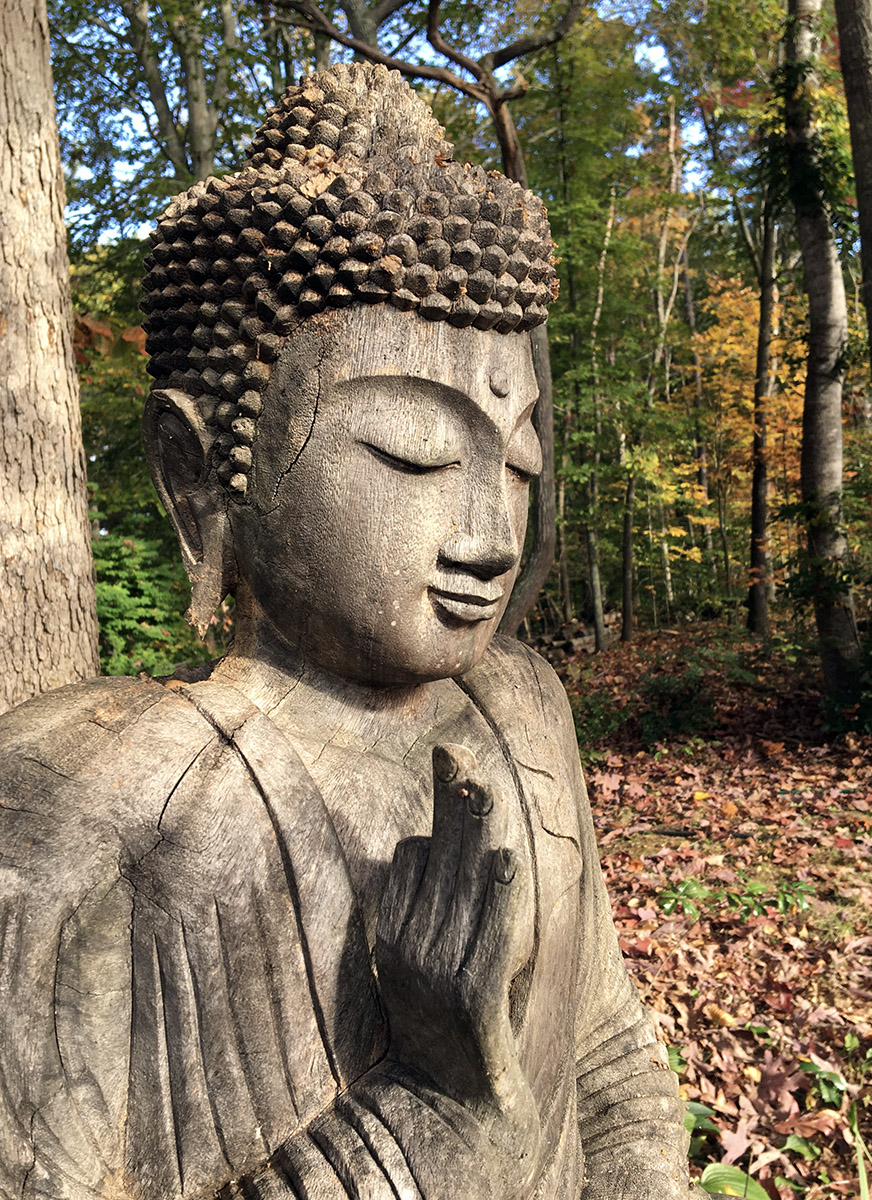Musings on Death
Great is the Matter of birth & death
Life slips quickly by
Time waits for no one
Wake up! Wake up!
Don’t waste a moment!
— traditional inscription on a Zen han (wooden block instrument)
Recently a longtime member of our sangha in Poland died quite suddenly. Basia Rozciecha lived in Wrocław, a city on the west side of Poland, where she had been a strong supporter of the affiliate sangha and zendo there. When some of us visited that picturesque city (known by the German name Breslau before post-war partitioning), to hold a workshop and spend time with that group some years ago, Basia generously hosted us at her home. Although in recent years she had not been to sesshin at our main center on the outskirts of Warsaw, she used to come often and once served on our board of trustees. We shall deeply miss her warm-hearted and lively presence and her dharma support.
There is a Danish proverb: The falling of a leaf is a whisper to the living.
Especially as we age we see, on this great Tree of Life, so many leaves falling, more and more all the time – friends, family members, acquaintances.
In the next decade or two, of course, many more of us will let go. For us elders, in the Winter season of our lives, that time grows ever closer.
But young people, too, can die, and do. Who can know?
If we face this fact, if we truly take it to heart, it can focus the mind like nothing else. It can light a fire under us and drive us deep in our practice. Death awareness can help to guide our lives along a straight, true path in accord with our deepest longings and aspiration.
The American poet Allen Ginsberg once said that the major revelation of his life was, “I am alive in a body that is going to die.” In Carlos Castaneda’s Journey to Ixtlan, the shaman Don Juan says to Castaneda, “That is why you are so moody and not fully alive, because you forget you are to die; you live as if you were going to live forever.”
For Don Juan death was an ally, an inspiration to make each moment more alive. “The thing to do when you’re impatient,” he advised, “is to turn to your left and ask advice from your death. An immense amount of pettiness is dropped if your death makes a gesture to you, or if you catch a glimpse of it, or if you just have the feeling that your companion is there watching you.”
If we listened to these words – and to all the great spiritual masters who have said more or less the same thing – imagine how radically different everything would be: our own lives and the societies and world we co-create. But for most of us, awareness of our own mortality is at best an abstraction, an uncomfortable concept. More likely we actively repress and run from it, escaping into an endless sea of distraction.
The American writer Annie Dillard goes directly to the point: Why does death so catch us by surprise, and why love? We still and always want waking. We should amass half dressed in long lines like tribesmen and shake gourds at each other, to wake up; instead we watch television and miss the show.
We’re wonderfully creative in finding ways to arrange our chairs on the deck of this Titanic, individually and globally: nations brutally attacking their neighbors, huge corporations laying waste to beings and the Earth in the name of “profit.” And all the while the ship we’re riding on, all of us together, heads straight for the iceberg of planetary destruction.
Breathtaking, isn’t it, this human capacity for busying ourselves with trivia on the brink of our own individual and collective demise?
When you’ve been practicing a while, people may sometimes say to you, “You’re so calm.” Being calm is a fine thing – after all, we need firm grounding in equanimity in order to live a good, fulfilling life. But our Zen practice can take us much, much further and deeper than mere calmness. It can help us to be more spontaneous and responsive and caring – more alive.
When we face and really open to it, death brings everything into focus. It reminds us of the preciousness of this life, this day, this very moment as it is. It opens us to the vital significance of living and loving fully, every day
Through deep zazen-samadhi we can actually personally confirm This that is impervious to birth & death – our own deepest nature that has always been free of the burden of a separate self, and altogether beyond the reach of time. This has never been touched by the Four Stages, mentioned by the Buddha, of Creation, Existence, Deterioration, and Destruction.
It is exactly to this that the “supreme, unfailing” mantra of the Heart Sutra points: Gate gate paragate – parasamgaté, bodhi svaha!
Roughly, in English: “Gone, gone, gone beyond, gone completely beyond, Awake rejoice!
Each person’s death is indeed a whisper – a loud shout to us, really — to face the great mystery of birth and death, to deepen our practice and penetrate right through our delusion of being separate and lacking. It vividly reminds us to relinquish all that is petty and self-centered, and to recommit to the Three Treasures: to Buddha, our own nature, whole and complete; to Dharma, the teaching and practice of the Buddha Way; and to Sangha – our dharma sisters and brothers, and all beings.
Ultimately, facing our own mortality has the power to lead us back to fully committing, with our entire being – all “360 bones and 84,000 pores” — to this very moment. In other words, it can bring us back to life.
When Death come
May he find you alive.
— African saying
Postscript: Just as I finished writing this, word reached me about the sudden death of another longtime Polish sangha member. Paweł Lipszyc worked as a translator and spent some time here at Windhorse years ago. His death has been a shock to many. This Saturday, January 28, we will be holding a service for both him and Basia at the Bodhidharma center on the southeastern outskirts of Warsaw. I will join on Zoom. — SK

